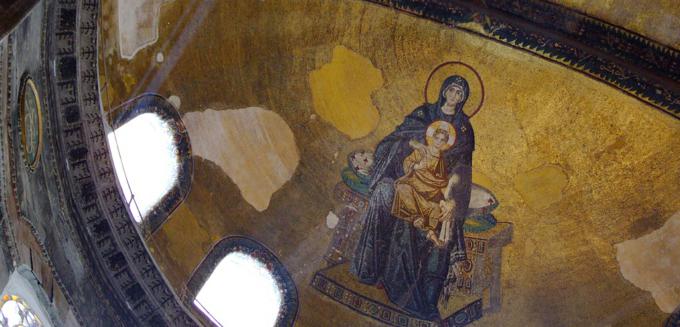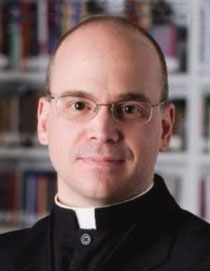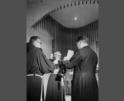
Culture
She is like us, but there is something so radically different about her identity and mission that while we can love her, we cannot fully understand her. She is a mystery. So it is with her Divine Son.

Grunow
Sunday (Jan. 1), while much of the world marks the new beginning of the calendar year, the Church will commemorate the great solemnity of the Mother of God.
What does this mean?
That the Blessed Virgin Mary is the Mother of God means that the child-- conceived in her womb by the power of the Holy Spirit, carried in her body for nine months, and born into this world-- is God. As such, this celebration highlights the pivotal truth of the Church's Faith- that God has, in Jesus Christ, accepted a human nature, chosen to be born into this world as we have all been born into this world, and has lived a real, human life.
In doing so, God has accepted the full implication of what is means to be human, including the experiences of suffering and death.
"Why" God did this is what the Scriptures are all about- from start to finish, from Genesis to Revelation. In fact, the Bible is not just some kind of spiritual "self help" book or just a collection of ancient literature- the Bible is the story of why God accepts a human nature in Christ.
Integral to the "why" of God living, like us, a real, human life is the story of a particular people- the people of Israel. God chooses Israel centuries before he reveals himself in Christ and invites them to prepare themselves to be the means by which he would reveal himself to the world in an extraordinary way. Israel, throughout the long ages of its history, glimpses what God will do (that he will become a man) but when this revelation finally happens, the people of Israel are taken by surprise.
The significance of Israel is highlighted in the testimony of the Gospel of Luke that insists that the child Jesus is circumcised. Remember, circumcision was the sign that Israel had been set apart from other peoples and nations for a particular purpose. In Christ, that purpose is revealed- Israel is the means by which God will reveal himself in the world- and the means by which God does this is by becoming an Israelite himself- being born into an Israelite family, learning its culture and customs, speaking its language, and living its unique way of life.
God's relationship with Israel is as such, that it can be likened to a mark as permanent, and at times painful, as that of circumcision. This is seen in all its terrifying intensity in the Cross.
Why Israel? This decision on God's part is mysterious.
The "how" of God accepting a human nature is an absolute mystery. It is a revelation that while it can be appreciated and believed, it can never be fully explained.
That the Blessed Virgin Mary is called Mother of God is not pious boilerplate, a kind of title by which we honor the woman who is the mother of Jesus Christ.
To testify that the Blessed Virgin Mary is the Mother of God is simultaneously a statement about her and a statement about Christ. On the one hand, it highlights the identity and mission of the Blessed Virgin Mary, an identity and mission that is absolutely singular and unique. No one else is or will ever be the Mother of God. No one else knows Christ as God in the manner that the Blessed Virgin Mary did.
God chose her in such a way that he does not choose us. God made the life of the Blessed Virgin Mary something that our lives will never be. There are points of contact between her experience and our own. She is fully and completely human, like we are. She is not divine. Nor does she, as a result of her unique identity and mission, turn into some kind of divine being. She is like us, but there is something so radically different about her identity and mission that while we can love her, we cannot fully understand her. She is a mystery.
So it is with her Divine Son.
When we identify the Blessed Virgin Mary as the Mother of God, the emphasis is only secondarily on her- it is primarily about Christ. Mary being referred to as the Mother of God tells us that Jesus Christ is God and was always God. Christ did not "turn" into God, and calling Christ God is not just some kind of projection by which we make Jesus of Nazareth someone very important. That Jesus is really and truly is God is a fact. God accepting a human nature in Christ and lived a real, human life is not just a story we tell that is all symbol, myth and legend- it is all true and it really happened.
Now, you might be waiting at this point for the "lesson"- a point of contact between the testimony I have given and your experience. We are accustomed to think that preaching must always deliver a lesson, but in this case, if there is a lesson, it is that God will always exceed human expectations and will do so in ways that are absolutely extravagant. What God had done and will do will not fit neatly into our categories of understanding nor will he be bound by what we think he should do.
What God will deliver to us are mysteries, and it is through these mysteries that we will be able to see and, even in our own limited way, understand who God is and what he asks of us. But even as this happens, what is given to us is not a way of figuring God out. The Incarnation of God in Christ is the singular and privileged way by which God reveals himself to the world. We see in Christ with the greatest clarity possible who God is and what he is all about.
This clarity of vision is made possible by God because it is in the radiance of his own life and love that he reveals himself in Christ. What we see in Christ is a mystery.
And that is the lesson: God has, in Christ, accepted a human nature and lived a real human life. It is this mysterious revelation that the Church, like Christ's Mother, the Mother of God, contemplates and treasures on this day, and all the days of the year.
- Father Steve Grunow is a priest of the Archdiocese of Chicago. He serves as CEO and Executive Producer for Bishop Robert Barron’s Word On Fire Catholic Ministries.
He writes on theology, movies, and popular culture for the Word on Fire blog.
Recent articles in the Culture & Events section
-
Building a legacyMichael Reardon
-
Scripture Reflection for Nov. 24, 2024, Solemnity of Our Lord Jesus Christ, King of the UniverseDeacon Greg Kandra
-
Seeds of graceMolly M. Wade
-
The dedication of St. Francis Chapel in the Prudential CenterThomas Lester
-
Honeybees are taking over for canariesDeacon Timothy Donohue


















